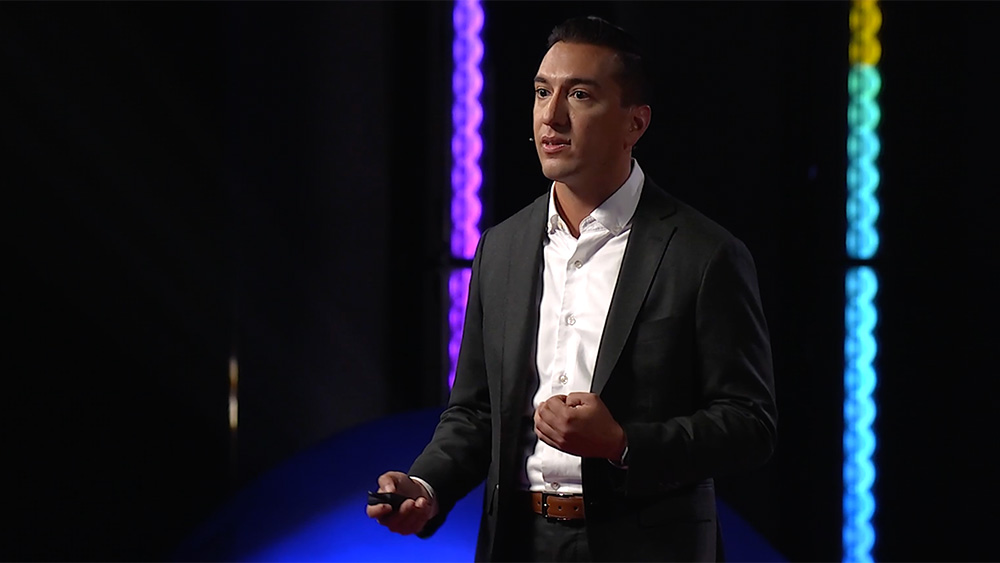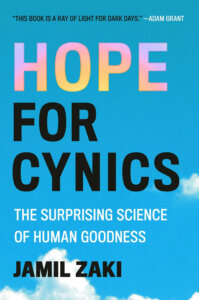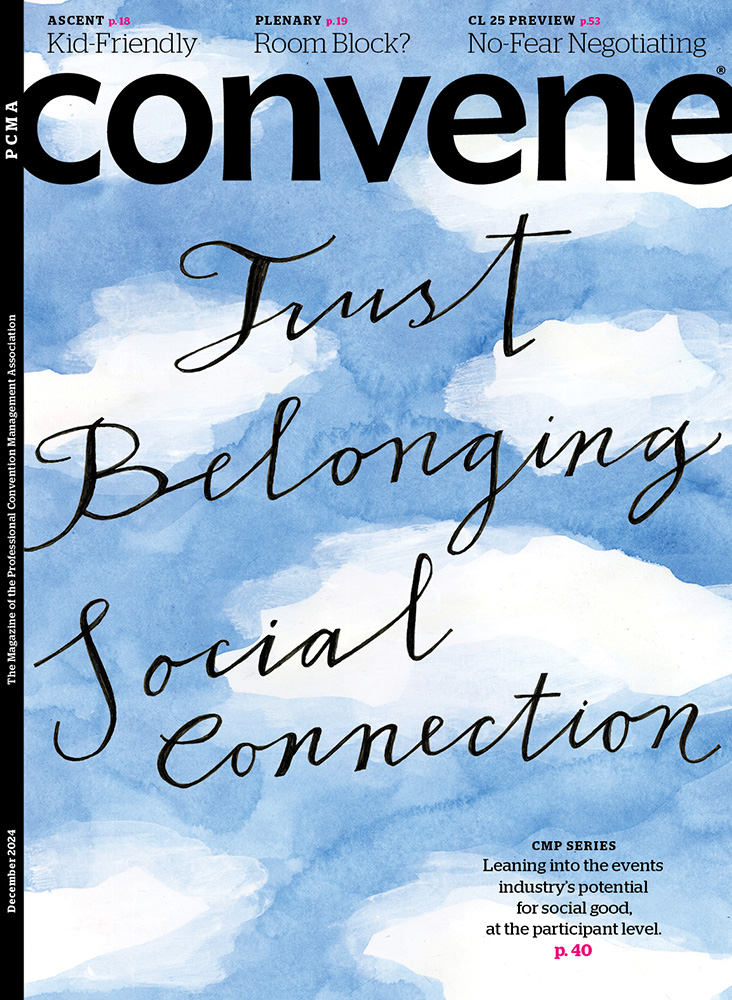
Stanford University psychology professor Jamil Zaki, who studies human connection, said he has struggled with his own cynicism in the past.
Jamil Zaki is a psychology professor at Stanford University, where he leads the Social Neuroscience Lab and has worked for two decades studying the science of human connection. His research into topics including empathy and kindness have made Zaki an “unofficial ambassador for humanity’s better angels,” he wrote in his latest book, Hope for Cynics: The Surprising Science of Human Goodness. In 2020, Zaki was often invited to speak via Zoom, to groups, schools, hospitals, and companies, who were struggling to find hope during the first year of the pandemic.
Privately, however, his own hope was gone. “On Zoom, from my living room, I celebrated human kindness to people around the world,” he wrote. “As soon as the screen went black, I returned to doomscrolling.” Zaki was struggling with cynicism, he wrote, a frame of mind the psychologist describes as a lack of trust in others and institutions.
Zaki is far from alone in reacting to personal and social events with cynicism, a response that has been growing in frequency over at least the last five decades — in 1972, when the National Opinion Research Center began collecting information in its General Social Survey, 45 percent of Americans agreed that “most people can be trusted.” By 2018, that had dropped to about 30 percent, Zaki reported. An international survey conducted in 2022 found that in 24 of 28 nations, most people said their tendency is to distrust others, he added.

Jamil Zaki’s book, Hope for Cynics: The Surprising Science of Human Goodness, was published earlier this year.
His job as a researcher is to be curious, Zaki wrote, and he began to study his own cynicism, separating the myths about cynicism from the evidence, and looking at what research has to say about its effects on individual and social wellbeing. One of the misconceptions that people hold is that cynics are smarter than others, Zaki wrote, while the evidence shows that opposite is true: Cynics perform less well on cognitive tests and have a harder time spotting liars than non-cynics. Cynics also think that mistrust of others keeps them safe, but in fact, it increases isolation and, at work, decreases collaboration between colleagues, he wrote. And when communities lose trust, “they grow unstable, like a Jenga tower with a bottom block knocked out. Crime, polarization, and disease rise,” he wrote. His deep dive into cynicism convinced Zaki that cynicism wears away the psychological glue that keeps us together and is, while not the only root cause, “an invisible thread tying together vast and varied problems,” including loneliness, alienation in the workplace, and hate-filled politics, he wrote.
“There is such a hunger for social connection. We are starved for it, even though there are more people on the planet than ever before,” Zaki told Convene. “And we are starved for it because we’ve been given a script by our culture, and especially our online culture, that trust and connection are for suckers.”
In his book, Zaki offers an alternative to cynicism that he calls hopeful skepticism. “Cynics imagine humanity is awful; skeptics gather information about who they can trust,” he writes. “In study after study, most people fail to realize how generous, trustworthy, and open-minded others really are,” he wrote. “The average person underestimates the average person.”
‘Conferences Are Kind of My Happy Place’
Since the publication of his book earlier this year, Zaki has been inundated with requests for interviews, he said, adding that he has had to turn most of them down. But he made time to talk to Convene — our interview began before 7 a.m. as he was commuting to his office at Stanford — because of the role, he said, that conferences and events play in the world in increasing trust in others and social connection. And, he added, “conferences are kind of my happy place.”
Ever since Zaki began attending scientific conferences as a grad student, “they’ve been my absolute favorite part of being in my field,” he said. “I loved communing with like-minded intellectually stimulating folks from all over the world, and I made so many friends there and collaborations with new colleagues. It was just extraordinary and remains that way.”
And “there’s something deeper there. As you know from my own confessional form of writing, I struggle enormously with cynicism,” he said. “But the thing is, cynicism is very easy to do two-dimensionally when you’re interacting with people online — when you don’t have a chance for real conversation, when you are interacting with the representation of somebody instead of the real person. And conferences break that down — they are fundamentally three-dimensional.
And because of that — and in general — when people actually interact with each other, they are far less cynical. Even if people disagree when they’re online, even if on message boards they are mistrustful of their community, when they get together in person, that is likely to melt away, at least a little bit.
“The way that I write about it in the book,” he said, “is that there’s a neighborhood-sized hole cut out in our culture of cynicism. If you ask people, ‘Do you trust people?’ most of them will say no. But if you ask them: ‘Do you trust the people in your neighborhood — your grocer, your barber, the people that you see on the street every day?’ most people say yes. So, if there’s a neighborhood-shaped hole cut out in [our] cynicism, there might be a conference-shaped hole cut out in it as well.”
Zaki also experiences conferences in a different way, he said, because he speaks at conferences around the world about building trust and connection. (His 2021 TED Talk, “How to Escape the Cynicism Trap,” has more than 3 million views.) Coming out of the pandemic, Zaki said, people experienced such “social hunger” that they “connected very quickly.” He recalled speaking at an educational conference in 2022 where participants were meeting for the first time again in person since the pandemic, and where organizers offered attendees stick-on red, yellow, and green dots for their badges, to signal how comfortable they were with physical closeness. The green dots — which meant a hug or a handshake were okay — were the first to disappear, he said. “People just wanted so badly to reconnect with each other.”

‘Intentional Exercises’ to Build Trust at Events
Many people had known each other for many years at that conference, he said. “Smaller conferences and older conferences, where people have longer relationships, are probably the most conducive to community.” But “intentional exercises to get people talking, especially with folks who they don’t know, and especially about deep things that they might not think they would talk about, can build rapport and connection, even in larger spaces and in spaces where people might be newer,” he said. “One of my favorite things to do as a speaker is to challenge people in my audiences to turn to the person next to them and have a conversation they might not expect — for instance, asking each other, ‘When is the last time you cried in front of somebody?’” The experience is daunting, Zaki said. “People do not think that they want to go that deep with a stranger next to them. But it turns out that when you prompt people to go deep, especially at a conference where they know that they’re already surrounded by their own community, it breaks the ice and allows for that trust and community to build naturally.”
Connection also can be built through engaging in “one of the things we lack so much in an adult culture — a sense of spontaneity and play and imagination,” Zaki said. For example, Zaki recently spoke at an alumni reunion at Stanford, which he compared to a giant conference, where a co-presenter did improv exercises with a crowd of 1,800 people. In one of the exercises, the presenter invited those in the audience to turn to someone they didn’t know and make up a memory together, Zaki said. It went like this: “‘So remember that time we went to the baseball game?’ And this person is a complete stranger, and they’re supposed to say, ‘Yeah, that game between the Cardinals and the Dodgers?’” Zaki said. The presenter called the exercise “one of the most connecting things that people can do, because people never have a chance to imagine together — at least not in their adult lives,” he said. “Giving people a chance to come together in their imaginations can be an enormously powerful way to make them feel connected. And just to have fun.”
I asked Zaki what he thinks about a topic we’ve written about before — the unity created by awe-inducing experiences and what’s required to create them. “I’m actually reading a book right now,” Zaki said, “on collective effervescence” — a term that describes how our physiology and our emotions align when we experience awe in a crowd — “and it’s such a beautiful phenomenon. Lights, camera, action, drones — yes, they all can create awe.” But he referred to work of his friend, the University of California, Berkeley psychology professor, Dacher Keltner, who asked tens of thousands of people what brought them awe. According to the results, “the most common source of awe was not drones or mountaintops or outer space or the Northern Lights,” Zaki said. “It was other people. It was what [Keltner] calls moral beauty. That is everyday goodness, and the way that it inspires us that we’re part of something bigger than ourselves in the human race. And it inspires us to do better as well.”
Zaki offered this suggestion to conference organizers: “If your budget doesn’t include drones but you want to generate awe, how about instilling a practice during the conference of positive gossip? That is: Ask everybody at the conference to notice one act of kindness or goodness or generosity or warmth that they see each day. And then write them down and either send them to the conference organizer through an app or write them down on a piece of paper and put them in a fishbowl — whatever the [conference] has the capacity for.
“And then at the end of each day, read a series of those positive gossip notes. These are the types of things that bind people together — collective awe happens through dance, through firewalking, through music, but it also just happens through the capacity to witness each other.” Collecting positive gossip will not just be great in those moments where people as a group are sharing the notes that people have offered, he said, but will help people notice each other’s goodness all day long. “It pops up the antenna in our minds through which to see the very good things that other people are typically always doing.”
Barbara Palmer is deputy editor of Convene.
Emotional Engagement
- How Events Can Foster Emotional Engagement
- An Event Entrepreneur’s Quest to Redefine Belonging
- 5 Ways Meetings Fuel Belonging
- Convention Centers Get Cozy With Intimate Meeting Spaces
- How to Make Belonging the Centerpiece of Your Events
- Social Connection: There’s an App for That
Earn CMP Credit
Earn one clock hour of certification by visiting pcma.org/convene-cmp-series to answer questions about the articles in this cover story package. The Certified Meeting Professional (CMP) is a registered trademark of the Events Industry Council.

